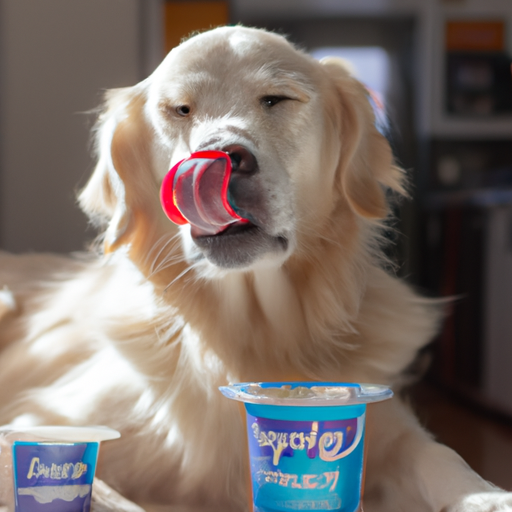As a devoted caretaker of your furry friend, you may often find yourself asking which foods are safe for your dog to consume. One such food item is yogurt. But is it safe for dogs? What kind of yogurt can dogs have? Let’s find out.
Understanding the Basics of Yogurt
Yogurt is a fermented dairy product made by adding live cultures of bacteria, often Lactobacillus species, to milk. The bacteria ferments the lactose in the milk, producing lactic acid which gives yogurt its distinctive taste and texture.
- Probiotics: These are beneficial bacteria that promote gut health. Yogurt is a rich source of these probiotics.
- Nutrients: Yogurt is also packed with essential nutrients like calcium, protein, vitamins B2 and B12, potassium, and magnesium.
However, not all yogurts are created equal when it comes to dogs. Here are some factors to consider:
- Sugar Content: Many yogurts, especially flavored ones, contain high levels of sugar. Too much sugar can lead to obesity and diabetes in dogs.
- Artificial Sweeteners: Some yogurts contain artificial sweeteners like xylitol, which is toxic to dogs.
- Dairy: Some dogs may be lactose intolerant, making it hard for them to digest dairy products, including yogurt.
What Kind of Yogurt is Safe for Dogs?
When choosing yogurt for your dog, it’s essential to select one that is safe and nutritious. Here are the best options:
Plain, Non-fat Yogurt
This type of yogurt is the safest for dogs. It’s low in fats and sugars, making it less likely to cause weight gain or upset your dog’s stomach. Ensure that it is free from artificial sweeteners.
Greek Yogurt
Greek yogurt is another excellent choice for dogs. It’s higher in protein and lower in lactose than regular yogurt, making it easier to digest. Plus, it’s also lower in sugar. However, it’s crucial to choose plain Greek yogurt without added sweeteners or flavors.
Probiotic Yogurt
Probiotic yogurts are a great choice for dogs, especially those with digestive issues. These yogurts contain live cultures that can help improve gut health. Make sure to choose a probiotic yogurt that is plain and low in sugar.
Potential Benefits of Yogurt for Dogs
Feeding your dog a small amount of the right type of yogurt can have several potential benefits:
- Digestive Health: The probiotics in yogurt can help promote a healthy gut microbiome, potentially aiding digestion and preventing gastrointestinal issues.
- Boosting Immunity: Some studies suggest that probiotics may help enhance the immune system, potentially reducing the risk of certain health issues.
- Bone Health: The calcium in yogurt can contribute to maintaining strong, healthy bones.
How to Serve Yogurt to Your Dog
When introducing yogurt into your dog’s diet, it’s important to start slowly. Begin with a small amount and see how your dog reacts. If they enjoy it and have no adverse reactions, you can gradually increase the quantity. Here are some serving suggestions:
- As a treat: You can offer a spoonful of yogurt as a special treat.
- Mixed with food: You can mix a small amount of yogurt into your dog’s regular food.
- Frozen yogurt treats: In hot weather, you can freeze yogurt into cubes for a refreshing treat.
Table: Recommended Yogurt Serving Sizes
| Dog Size | Serving Size |
|---|---|
| Small (up to 20 lbs) | 1-2 teaspoons |
| Medium (20-60 lbs) | 1-2 tablespoons |
| Large (over 60 lbs) | 2-3 tablespoons |
Frequently Asked Questions
Can all dogs eat yogurt?
While most dogs can safely consume yogurt, some may be lactose intolerant or allergic to dairy. Always start with a small amount and monitor your dog for any adverse reactions.
What if my dog doesn’t like yogurt?
That’s okay. There are plenty of other healthy treats you can offer your dog.
Can I feed my dog yogurt every day?
While yogurt can be a healthy treat for dogs, it should not make up a large part of their diet. Feed it in moderation and always alongside a balanced, nutritious diet.
Can puppies eat yogurt?
Puppies can eat a small amount of yogurt, but it’s best to wait until they are at least six months old and their digestive system is more mature. Always consult with your vet before introducing new foods into a puppy’s diet.
What should I do if my dog eats a large amount of yogurt?
If your dog consumes a large amount of yogurt, especially if it’s a type not recommended for dogs, they may experience gastrointestinal upset. Consult your vet if you notice any signs of distress.
Remember, every dog is unique and may react differently to new foods. Always consult your vet before making significant changes to your dog’s diet.



